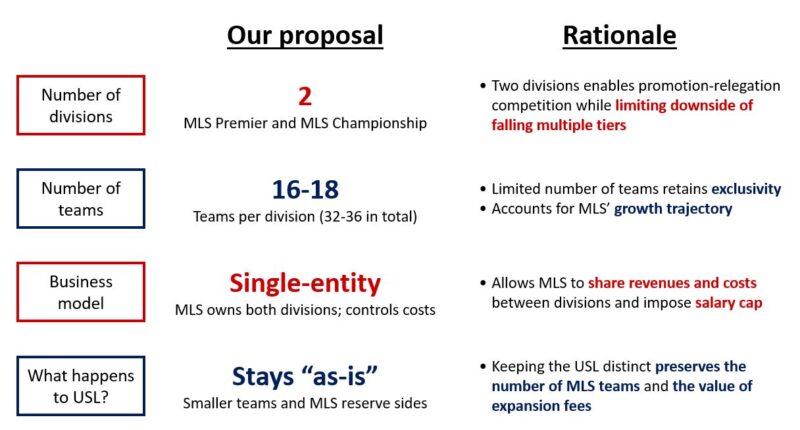Every year, there is talk about whether the MLS should adopt a European-style promotion relegation system. The system itself is simple enough. At the end of the season, the worst teams in the top division are replaced by the best teams in the lower division. And yet, every year, the same sides repeat the same arguments. Many fans want a promotion relegation system. It makes the season more competitive and gives smaller cities the chance to play in the top division. Many owners hate the system. It could cause the team they spent millions on to lose their place in the primetime. That’s as far as the conversation goes.
The current state of the MLS
And yet, the time may be coming to consider a change. On one hand, the MLS is flying high. Team valuations are soaring. An investor group recently bought a minority stake in DC United that valued the team at $710M, more than Premier League stalwart Everton. Pre-Covid, stadium attendance reached the same levels as the NBA and NHL.
On the other hand, there are concerns about the league’s long term viability. The Premier League outperforms the MLS, both in ratings and in broadcast rights fees, even though Premier League matches are shown in the undesirable Saturday morning timeslot. On the field, MLS sides have failed to win the CONCACAF Champions League for over 20 years, falling primarily to competition from Mexico’s Liga MX each year. And financially, many MLS teams are struggling to break-even despite the league’s strict salary cap.
In short, the MLS is at a crossroads. While its teams are valuable and attendance encouraging, its quality of play is disappointing and its finances are unstable. How long can the league maintain its high team valuations without improving the quality of its product? How can the league improve the quality of its product if it doesn’t have cash to invest in better players?
The case for a ‘closed’ MLS promotion relegation system

The answer, we believe, is a ‘closed’ promotion-relegation system. In a closed system, the MLS splits itself into two divisions, MLS Premier and MLS Championship. Each season, the three worst teams from MLS Premier are relegated to MLS Championship. The three best teams from MLS Championship are promoted to MLS Premier. There are no other divisions. Teams from non-MLS cities must continue to apply to join the MLS’ league structure. There are two reasons to believe a closed system would help the MLS:
A closed MLS promotion relegation system would increase the quality of play
Many academic studies on promotion-relegation find that it improves the quality of play. These studies argue that quality improves because teams are under more pressure to compete. Teams invest heavily in their players and poor ownership groups either sell out or lose. The closed-system we propose purposely prevents either of these things from occurring. Increased spending would disrupt the league’s finances and MLS ownership would never vote to put themselves on the hot seat.
Incentives for players to compete harder
There are still reasons to believe, however, that competitive pressure alone would improve the quality of play. One would be by creating a competitive culture in which the players compete harder. The prospect of promotion-relegation motivates individual players, whose value decreases if they play in a lower league.
This is a view held by the players themselves. In fact, a survey of MLS players revealed that 63% favored promotion-relegation. One player argued promotion-relegation puts a “spark always on your butt. It makes every point so much more meaningful.”1 Former US star DeMarcus Beasley argues that the MLS needs a promotion-relegation system “100%.” He elaborated that putting “more pressure on the league..[and] the players” would make players “mentally tough” and more competitive.2 Players that have moved from the MLS to Europe have cited the competitive pressures as one of the biggest adjustments to life abroad. Specifically, players noted more “intense training sessions” and more competition for playing time.3 DeAndre Yedlin, who joined the Premier League from Seattle, attributed much of the competitive culture to the relegation system. “Kids here are growing up knowing about relegation and how important it is.”4
Incentives for teams to spend smarter
Competitive pressure would also encourage teams to spend smarter. A key recommendation of a Boston Consulting Group MLS study was for teams to better allocate their salaries to improve the quality of play. In particular, the study noted that many teams focused too much on their designated players, who did not “provide the technical quality, perceived quality…commensurate with the significant spend on them.”5 Likewise, the study proposed sourcing players globally for non-designated player roster spots, since global players offered better quality than local products at a similar price.6 From a promotion-relegation perspective, the takeaway from these two recommendations is that there is room for competitive pressure to make roster spending more efficient.
A closed MLS promotion relegation system would not hurt the league’s finances
Perhaps the biggest objection to a promotion-relegation system is the possible impact it would have on the league’s finances, specifically on the valuation on operating income of relegated teams. While the goal is to have enough of an impact on relegated teams to spur them to raise their quality of play, there is little reason to believe that relegation would be devastating for the teams impacted. From a valuation perspective, a two-division closed-system does not allow for new entrants, which preserves the scarcity driving today’s high franchise valuations. Although a club might (and hopefully does) suffer a decline in value after being relegated, the closed-system effectively places a floor under how far the club’s valuation could fall.
From the standpoint of operating income, the closed-system allows the MLS to continue to control expenses while redistributing changes in revenues as necessary. As long as the league does better under the new system, everyone wins. With respect to expenses the MLS can continue to impose a strict salary cap to prevent each team from spending wildly to acquire the best players. With respect to revenues, the league can cushion the blow of relegation by redistributing some revenues to teams in the lower division. The closed-system, then, would allow the league to fine-tune the impact of relegation so that relegation gives teams the incentive to compete without obliterating their finances.
Next steps
It would take several years before a promotion-relegation system could be implemented in the MLS. The league still needs another five years or so to bring in the remaining few expansion franchises and allow them to get settled in the league. In transitioning to a two-division system, the MLS could declare that the results from an upcoming season determine the initial placement in the upper or lower divisions. This alone would create an enormous amount of excitement and competitive pressure for the league. The main obstacle moving forward is getting alignment with the owners. A promotion-relegation system would require the league to set up revenue sharing rules based on performance. While the discussion above suggests a promotion-relegation system is financially viable, the league will have access to more recent data / trends which could indicate otherwise.
Whatever the league decides, it is clear that the MLS is approaching a crossroads. While it has established itself as a viable professional league, it must satisfy the expectations of its growing ownership group. At the same time, it should not jeopardize its soaring team valuations and quality in-game experiences. Overall, a closed promotion-relegation model retains the best parts of the MLS today while laying the foundation for a more competitive professional soccer culture in America.
References
1ESPN Staff, “MLS Confidential: Players Polled on U.S. failure, salaries, pro/rel” March 21, 2018. Link
2Panizo, “DeMarcus Beasley believes MLS needs promotion and relegation.” August 13, 2019. Link
3ESPN, “How USMNT prospects adapt to life in Europe and what their clubs do to help.” January 20, 2021. Link
4ESPN, “MLS promotion, relegation would make league more competitive – Yedlin.” April 16, 2020. Link
5Tenorio and Maurer, “Inside the confidential 2016 study that provided the blueprint for the MLS’s modern era.” November 8, 2019. Link
6Ibid.



